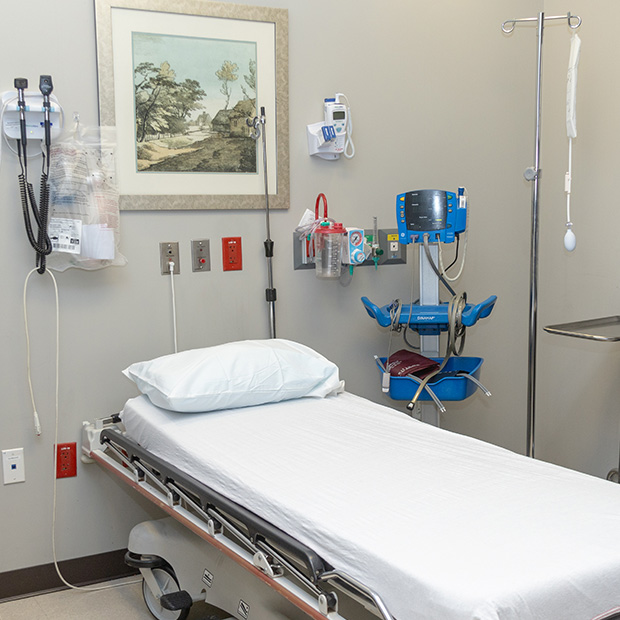
Dallas Emergency Care for Breathing Difficulties
Understanding Breathing Difficulties as a Medical Emergency
Breathing is something most of us take for granted—until it becomes difficult. While shortness of breath (SOB) after intense exercise can be normal, any unusual difficulty breathing, especially if it is not exercise-induced, should never be ignored. At Advance ER, we’re here to provide immediate, expert care for breathing emergencies 24/7, with no wait time to be seen by a board-certified emergency care physician.
Call (214) 494-8222 or contact us online or use the text box below to learn more about emergency care for breathing difficulties in Dallas.
Symptoms of breathing emergencies may include:
- Shortness of breath (dyspnea)
- Wheezing
- Breathlessness
- Quick, shallow breathing
- Persistent coughing
- Dizziness or lightheadedness
- Nausea
- Anxiety or panic
- Blue discoloration around the lips or fingers (cyanosis)
- Confusion or disorientation
- Chest pain
- Swelling of the airway, tongue or lips
Shortness of breath can be caused by many things, including:
- Asthma
- Heart attack
- Lung damage
- High blood pressure
- Allergies
- Pneumonia
- Blood clots
- Altitude sickness
Even if symptoms seem mild at first, any abnormal difficulty in breathing can signal a serious underlying condition and should prompt a visit to the emergency room.
Recognizing the Symptoms of Shortness of Breath
Shortness of breath, also known as dyspnea, is a subjective sensation of difficulty or discomfort in breathing. It can vary in intensity and may be accompanied by other symptoms such as rapid breathing, chest tightness, wheezing, or a feeling of suffocation. Shortness of breath can be a sign of various underlying health conditions, ranging from mild to serious.
Importance of Seeking Medical Attention for Breathing Issues
It is important to seek medical attention if you experience shortness of breath because it can be a symptom of a potentially life-threatening condition. Here are a few reasons why medical attention is necessary:
- Identifying the underlying cause: Shortness of breath can be caused by a wide range of conditions, including respiratory infections, asthma, chronic obstructive pulmonary disease (COPD), heart problems, pulmonary embolism, anxiety, or even certain medications. Seeking medical attention allows healthcare professionals to evaluate your symptoms, conduct appropriate tests, and determine the cause of your breathing difficulties.
- Assessing the severity: Healthcare providers can assess the severity of your shortness of breath and determine if it requires immediate attention or if it can be managed with outpatient care. They will evaluate your vital signs, listen to your lungs, and may order additional tests, such as chest X-rays, blood tests, or electrocardiograms (ECG), to gather more information.
- Preventing complications: Some causes of shortness of breath, if left untreated, can lead to complications or worsen over time. For instance, certain lung conditions, like pneumonia or pulmonary fibrosis, may progress and result in irreversible damage if not addressed promptly. Seeking medical attention allows for early intervention, preventing potential complications and promoting better outcomes.
Remember, shortness of breath is a symptom that should not be ignored. If you experience sudden or severe shortness of breath, chest pain, or any other concerning symptoms, seek immediate medical attention.
Frequently Asked Questions About Emergency Care for Breathing Difficulties
When should I go to the emergency room with breathing difficulties?
You should come to the ER if you experience:
- Any unusual shortness of breath, even if it is not severe. If your breathing feels different or difficult for no clear reason, it’s important to seek medical attention. Mild or unusual SOB can be an early sign of a serious condition.
- Sudden or severe shortness of breath. Struggling to catch your breath or gasping for air requires immediate care.
- Difficulty speaking due to breathlessness. If you can’t complete a sentence without stopping to take a breath, this is a red flag.
- Chest pain, especially if it radiates to the arms, neck, or jaw.
- Breathing difficulties combined with chest pain could indicate a heart attack, coronary vasospasm, or other cardiac emergencies.
- Bluish discoloration of your lips or fingernails. This may indicate oxygen levels are critically low.
- Confusion, dizziness, or fainting. These symptoms suggest your brain or body isn’t getting enough oxygen.
- A sense of fear or impending doom. If you feel something is seriously wrong, trust your instincts and seek medical help.
At Advance ER, we’re ready to provide fast and thorough care for all levels of breathing difficulties.
What are possible causes of shortness of breath?
Shortness of breath can stem from a variety of conditions, including:
- Respiratory conditions: Asthma, Pneumonia, Pulmonary embolism, COPD (chronic obstructive pulmonary disease)
- Heart-related issues: Heart attack, Myocarditis, Coronary vasospasm
- Other causes: Allergic reactions, Anxiety or panic attacks, Blood clots, High-altitude sickness
Should abnormal shortness of breath be taken seriously?
Shortness of breath can have a wide range of causes, some mild and others life-threatening. While older adults or those with chronic conditions are often at higher risk, young, healthy individuals are not immune to serious respiratory or cardiac issues. Even if symptoms seem mild at first, any abnormal difficulty in breathing can signal a serious underlying condition and should prompt a visit to the emergency room.
Are there emerging risks for younger people with breathing difficulties?
Yes, even mild or brief episodes of unusual shortness of breath in young individuals could signal the below or other serious conditions. It’s always better to seek care early.
- Pulmonary Embolism (PE): A PE occurs when a blood clot travels to the lungs, blocking blood flow and causing severe shortness of breath, chest pain, and sometimes a rapid heartbeat. In recent years, PE cases have increased in younger populations due to factors like prolonged sitting (e.g., working remotely or traveling), dehydration, certain medications, and hormonal therapies.
- Myocarditis: Myocarditis is inflammation of the heart muscle, which has become more common in recent years. Symptoms often include shortness of breath, chest discomfort, and fatigue. It can occur after viral infections or as an autoimmune reaction.
- Coronary Vasospasm: This condition involves a temporary narrowing of the blood vessels supplying the heart, often triggered by stress, stimulants, or medications such as ADD/ADHD treatments. Vasospasm can mimic a heart attack, causing chest pain and breathing difficulties.
Why should I choose Advance ER for breathing difficulties?
At Advance ER, we’re dedicated to providing superior care for breathing emergencies. Here’s why we stand out:
- Open 24/7: Breathing problems can strike at any time, so we’re always here for you
- No Wait Times: Unlike traditional ERs, you’ll be seen immediately
- Board-Certified Physicians: Our team of experienced emergency doctors ensures you receive expert care
- State-of-the-Art Facilities: From advanced imaging to in-house labs, we have the tools to diagnose and treat you quickly
What can I expect during an emergency room visit at Advance ER for breathing difficulties?
During an emergency room visit for breathing difficulties, here's what you can expect:
- Immediate care: There is no wait time at Advance ER. You will be seen immediately by a board-certified emergency physician.
- Oxygen therapy: If needed, oxygen will be provided to help stabilize your breathing.
- Comprehensive Diagnostics: We offer advanced on-site testing to quickly identify the cause of your symptoms, including:
Blood tests- to check for infections or blood clots
Chest X-rays or CT scans- to evaluate your lungs
Electrocardiograms (EKG)- to assess heart function. - Targeted treatment: Depending on the diagnosis, treatment may include:
Medications- to relieve symptoms or address underlying issues (e.g., blood thinners for clots, bronchodilators for asthma)
Advanced procedures or interventions- if needed
What questions should I be prepared to answer when I arrive at the emergency room?
You may be asked questions such as:
- What are your symptoms?
- When did your symptoms begin?
- What medications are you currently taking?
- Do you have any allergies?
- Do you have any underlying medical conditions?
Breathing difficulties should never be ignored, whether they’re mild, unusual, or severe. At Advance ER, we provide fast, compassionate, and expert care for all levels of respiratory emergencies. If you're experiencing any abnormal shortness of breath, visit Advance ER at one of our two Dallas locations for immediate assistance, or call us at (214) 494-8222 today.

-
 The Advance ER Team Providing Reliable Medial Care
The Advance ER Team Providing Reliable Medial Care -
 ER Insight Vital Knowledge for Life-Saving Moments
ER Insight Vital Knowledge for Life-Saving Moments -
 ER Knowledge Hub Your Source for Expertise on Health, Emergencies, and Beyond
ER Knowledge Hub Your Source for Expertise on Health, Emergencies, and Beyond
Steps to Take When Someone is Struggling to Breathe
First and foremost, call 911 and clearly explain the situation to the dispatcher. While waiting for help to arrive, you can loosen any tight clothing that might be restricting airways or blood flow. If the person has an inhaler, make sure they have access to it. If you or anyone else in the room knows CPR, be prepared to administer it.
Try to keep the atmosphere calm. Anxiety can make breathing problems worse. You’ve done the right thing by contacting medical professionals. Take comfort knowing that you have taken action.
The emergency care professionals at Advance ER provide specialized treatment for patients with breathing difficulties in Dallas. Contact us at (214) 494-8222 if you would like to learn more.
Related Reading:



[8].2112210947272.png)